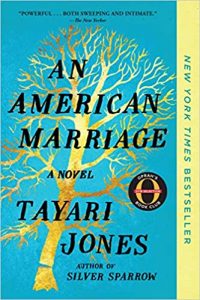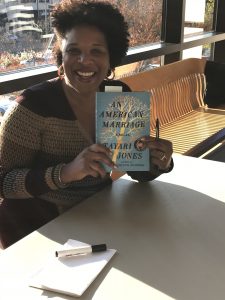TAYARI JONES AND AN AMERICAN MARRIAGE
I’ve been a fan of the writing of Tayari Jones since I read her novel Silver Sparrow several years ago, so I approached her new novel, An American Marriage, with a great deal of happy anticipation. I was not disappointed. But then numerous awards organizations can’t be wrong. Among the many honors An American Marriage has won since its publication in 2018 are Oprah’s Book Club selection, nomination by the American Booksellers Association for the 2019 Indies Choice Book of the Year Award, selection for the 2019 Women’s Prize for Fiction shortlist, and selection as a finalist for the Los Angeles Times book prize.

All of these groups had various reasons for honoring An American Marriage, but for me the joy of reading the novel sprang from two main sources: Jones’s fresh approach to what could have been a hackneyed story and the beautiful simplicity of her writing.
The sentences Jones constructs are not overly long or complex; they flow to a reasonable length with the perfect combination of words to carry the reader smoothly along. They also contain original similes perfect for the characters. For example, “My affection for her is etched onto my body like the Milky Way birthmark scoring my shoulder blades.”
The story in An American Marriage concerns a young professional black man named Roy, who is sent to prison for a rape he didn’t commit. Last November I was privileged to attend a presentation Jones gave about the novel, in which she acknowledged that one of her goals in writing this story was to give back to society by drawing attention to some of the shortcomings of the prison system in America. But she opens up the story by focusing well beyond Roy’s prison experience to explore the effects the prison time has on Roy, his wife Celestial, and their friend Andre.
During the five years Roy is incarcerated, the relationships among these three people change dramatically. Because Roy’s in prison, Celestial and he decide to abort her pregnancy. Then, as a professional doll maker, Celestial creates a black baby doll that looks like Roy and dresses him in a prison uniform to make a statement. When the doll wins a contest at the National Portrait Museum, Roy finds out about it and is hurt that she didn’t tell him. Throughout these and other difficult circumstances, Andre is there to support Celestial. As time passes, Roy and Celestial’s relationship weakens, while she grows closer to Andre.
Jones explores these developments and their emotional impact on the players involved in a remarkable group of letters between Celestial and Roy. It’s a simple, yet highly effective, way to reveal how deeply each of them is suffering—and sets the stage for the final blow when Celestial writes to tell Roy she no longer wants to be his wife.

Before she can take any action to dissolve the marriage, Roy’s lawyer works a miracle, and he’s released from prison. This development puts Roy, Celestial, and Andre in a dilemma. Roy, after spending years incarcerated for a crime he didn’t commit, wants nothing more than to be reunited with his wife. Andre, after admitting he’s been in love with Celestial since they were children, wants nothing more than to spend the rest of his life with her. And Celestial, while she loves Andre, is uncertain what she should do.
The moral ambiguity of the situation, Jones said at the meeting in November, provided a key element of the novel. More than one character is right, but they disagree. The book’s individualized chapter structure gives Jones an opportunity to explore each character’s understandings, misunderstandings, and inner conflicts, which she does with brilliant insight. As the story progresses, the reader’s allegiances shift like a frequently diverted stream.
Another aspect of An American Marriage that captured my interest, because I explore the same idea in my novel Surface and Shadow, is society’s understanding of gender. Roy, especially, has very fixed beliefs about who he should be as a man, and once he’s in prison, he thinks all those characteristics have been taken away from him. He has to figure out what he still has to give to society. Celestial is also boxed in by expectations of who she should be as a woman and a wife.
I knew from reading Silver Sparrow that Jones has a gift for developing and revealing complex characters through direct lyrical language, but she takes her gift to a higher level in An American Marriage. I can’t wait to see what her next novel brings.
Sally Whitney
Sally Whitney is the author of When Enemies Offend Thee and Surface and Shadow, available now from Pen-L Publishing, Amazon.com, and Barnesandnoble.com. When Enemies Offend Thee follows a sexual-assault victim who vows to get even on her own when her lack of evidence prevents police from charging the man who attacked her. Surface and Shadow is the story of a woman who risks her marriage and her husband’s career to find out what really happened in a wealthy man’s suspicious death.
Sally’s short stories have appeared in magazines and anthologies, including Best Short Stories from The Saturday Evening Post Great American Fiction Contest 2017, Main Street Rag, Kansas City Voices, Uncertain Promise, Voices from the Porch, New Lines from the Old Line State: An Anthology of Maryland Writers and Grow Old Along With Me—The Best Is Yet to Be, among others. The audio version of Grow Old Along With Me was a Grammy Award finalist in the Spoken Word or Nonmusical Album category. Sally’s stories have also been recognized as a finalist in The Ledge Fiction Competition and semi-finalists in the Syndicated Fiction Project and the Salem College National Literary Awards competition.
- Web |
- More Posts(67)